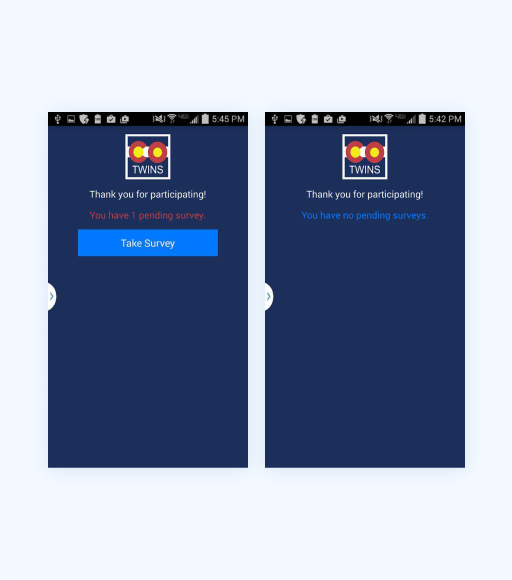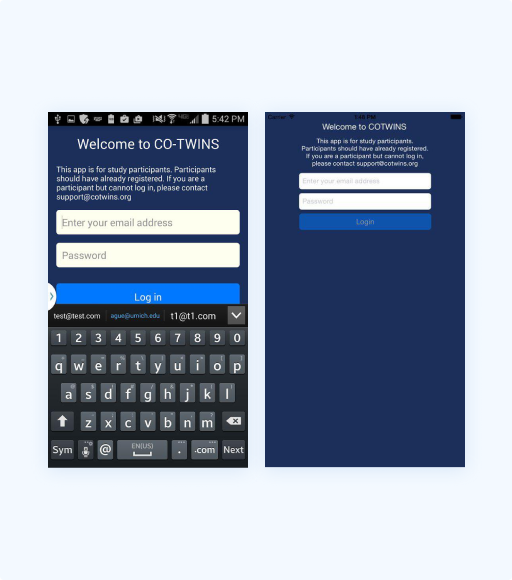- Client:
- Industry:
- Duration:
- Team:
MTogether is a research platform developed at the University of Michigan School of Information enabling academic researchers to study social media behavior across platforms. Funded by Google Research ($500k) with additional support from Facebook and NIH, we built browser extensions, mobile apps (iOS/Android), and backend infrastructure allowing researchers to collect person-centric data about social media usage, online behavior, and health outcomes across multiple platforms simultaneously.
THE CHALLENGE
Professor Paul Resnick and the University of Michigan School of Information needed a research platform enabling academic study of social media behavior - but existing approaches were fundamentally limited. Social media companies conduct internal experiments on their own platforms, but no broad research infrastructure existed for studying user behavior across multiple platforms from a person-centric perspective.
The complexity
- Build cross-platform monitoring (browser extensions for Chrome, Firefox, Safari + mobile apps for iOS and Android)
- Track user behavior across multiple social media sites simultaneously (Facebook, Twitter, Reddit, Instagram, etc.)
- Collect sensitive behavioral data (time spent, posting patterns, content exposure) with strict IRB compliance and privacy protections
- Enable intervention studies where researchers can present surveys and experimental treatments
- Support longitudinal studies tracking behavior over months/years
- Process and analyze behavioral data at scale while ensuring participant anonymity
- Integrate with external research studies (e.g., Colorado adolescent substance use study linking social media to health behaviors)
The research question demanded person-centric data - understanding how individuals split time across platforms, how usage patterns change over time, and correlations with other behaviors - but existing tools only provided site-centric views. Building this infrastructure meant solving technical challenges (cross-platform monitoring, offline data collection, privacy-preserving analytics) alongside research methodology challenges (IRB compliance, informed consent, participant retention).
University of Michigan chose AnvilEight based on Python/Django expertise, proven mobile development capability (iOS + Android), and understanding of academic research requirements including ethics compliance and multi-year project timelines.
THE RESULTS
A 10+ year partnership delivering research infrastructure enabling groundbreaking social media behavioral studies, funded by Google Research, Facebook, and NIH.
10+ Years Partnership with U-Michigan

Cross-Platform Browser + iOS + Android
Multiple Studies NIH, Social Media, Health Research
Research Infrastructure Delivered
- Browser extensions (Chrome, Firefox, Safari) monitoring social media usage across platforms
- Mobile apps (iOS and Android) tracking mobile social media behavior and location
- Backend research platform processing behavioral data and delivering interventions
- Survey delivery system presenting questionnaires on participants' devices
- Data analytics infrastructure enabling researchers to study cross-platform behavior patterns
- Privacy-compliant architecture with IRB approval for sensitive behavioral tracking
Research Enabled
- Google-funded MTogether platform studying social media usage patterns across platforms
- NIH substance use study ($272k sub-award) linking adolescent social media behavior to substance use
- CU Boulder collaboration tracking 400 adolescent twins over one year
- Annual State of Social Media reports presenting findings to corporate sponsors
- Academic publications advancing understanding of social media behavior and health outcomes
Technical Achievements
- 10+ years platform stability maintaining infrastructure across platform API changes
- Cross-platform consistency collecting comparable data from web (3 browsers) + mobile (iOS + Android)
- Privacy-preserving architecture enabling sensitive behavioral research with IRB approval
- Scalable data processing handling behavioral tracking from hundreds of research participants
- Longitudinal data quality maintaining participant engagement over months/years of study
OUR APPROACH
We operate as Professor Resnick's technical implementation team for over 10 years, building and maintaining research infrastructure supporting multiple academic studies. Starting from initial platform design through ongoing evolution supporting new research questions, we've delivered cross-platform monitoring technology enabling studies impossible without person-centric data collection.
Technical Architecture
- Backend: Python, Django, SQLAlchemy, Google App Engine, Web2Py
- iOS App: Objective-C, Cocoa Touch, CoreLocation for geolocation tracking
- Android App: Java, Android SDK, Google Services for behavioral monitoring
- Browser Extensions: Chrome, Firefox, Safari plugins for web behavior tracking
- Infrastructure: Database migration (Alembic), CI/CD (Jenkins), automated testing (Selenium)
Development Process
- Agile/Scrum with sprints coordinating across backend, mobile, and browser extension development
- Regular research meetings ensuring technical capabilities support evolving research questions
- IRB compliance review for all data collection features touching participant information
- Participant privacy prioritization in every architectural decision
Key Technical Decisions
Person-Centric Cross-Platform Architecture
Traditional approaches study single platforms (Facebook provides Facebook data, Twitter provides Twitter data). Research questions demand understanding how individuals split time across platforms. We architected monitoring spanning browser extensions (tracking web usage) + mobile apps (tracking mobile usage) with unified backend correlating behavior across platforms. This person-centric view - impossible without custom infrastructure - enabled novel research insights.
Privacy-First Behavioral Tracking
Tracking social media behavior involves sensitive data: which sites visited, time spent, content viewed, posts created. We architected privacy protections from the start: participant consent for specific tracking, anonymization in data processing, secure transmission/storage, participant control to pause/stop tracking, and IRB-compliant data retention policies. Privacy wasn't added later - it was foundational architecture enabling university ethics approval.
Intervention Delivery Platform
Beyond passive monitoring, researchers needed to deliver interventions: presenting survey questions, showing experimental treatments, nudging behavior changes. We built delivery infrastructure: presenting questionnaires on participants' devices (desktop + mobile), tracking completion rates, supporting randomized experimental conditions, and enabling time-based or event-triggered interventions. This transformed MTogether from monitoring tool to experimental platform.
Longitudinal Data Collection Resilience
Research studies track participants over months/years - technology must remain stable despite platform API changes. We abstracted platform-specific details (Facebook API, Twitter API evolve constantly), built robust error handling (network failures, authentication expiration), and maintained backward compatibility (don't break ongoing studies when adding features). This engineering discipline enabled multi-year research continuity.
Scalable Analytics Infrastructure
Behavioral data grows large quickly (every page view, post, session tracked). We optimized database schemas for analytical queries, implemented efficient data processing pipelines, built researcher-facing analytics dashboards, and enabled data export for external analysis tools (R, Python, SPSS). Researchers needed answers, not just raw data - our infrastructure delivered both.
Testimonial
"Andrii has pulled together teams for me on different projects over the past few years. They specialize in Python-based web development (Django, Google App Engine) and mobile apps (iOS and Android). I've learned a lot about good development practices from them, some of which I now try to teach to my students!"
Professor Paul Resnick - University of Michigan School of Information
TECHNICAL CHALLENGES SOLVED
Challenge 1: Cross-Platform Behavioral Monitoring
Problem: How do you collect comparable behavioral data across web (Chrome/Firefox/Safari), iOS, and Android when each platform has different APIs, permissions models, and technical constraints?
Solution: Built platform-specific implementations sharing common data models and backend APIs. Browser extensions used JavaScript with platform-specific permission handling; iOS used CoreLocation and background processing; Android used different approaches across API versions. Backend abstracted platform differences, providing researchers unified datasets regardless of participants' device choices.
Challenge 2: Privacy-Compliant Sensitive Data Collection
Problem: Tracking social media behavior involves sensitive information requiring university IRB approval. How do you collect research-necessary data while protecting participant privacy and meeting ethics requirements?
Solution: Architected privacy protections comprehensively: informed consent workflows explaining tracking scope, participant controls to pause/disable monitoring, data anonymization separating identity from behavior, secure transmission/storage with encryption, and IRB-approved data retention policies. Privacy protection enabled ethics approval, which enabled research - technical architecture determined research feasibility.
Challenge 3: Long-Term Platform Stability During API Evolution
Problem: Social media platforms constantly change APIs, authentication mechanisms, and data access policies. How do you maintain research infrastructure over years when underlying platforms shift?
Solution: Abstracted platform-specific code into adapters isolating API changes, implemented robust error handling recovering from authentication failures and API rate limits, maintained comprehensive logging identifying breaking changes quickly, and established update processes minimizing disruption to ongoing studies. Platform evolution couldn't break multi-year research - our architecture ensured continuity.
Challenge 4: Participant Retention Over Longitudinal Studies
Problem: Academic research requires tracking participants over months/years, but browser extension/app installations often get abandoned. How do you maintain participant engagement?
Solution: Minimized performance impact (lightweight monitoring not slowing browsers/devices), provided participant value (personalized usage reports showing their own patterns), implemented gentle reminders without nagging, and designed unobtrusive monitoring not interfering with normal usage. Technical quality enabled research methodology - participants stayed enrolled because technology worked well.
KEY RESEARCH PROJECTS SUPPORTED
MTogether Platform (Google Research, $500k)
Core platform studying social media usage patterns across platforms. Research questions: How much time do users spend daily on social media? How do they split activity across platforms (Facebook, Twitter, Reddit, Instagram)? How do patterns change over time? Browser extensions and mobile apps collected cross-platform behavioral data enabling person-centric research impossible with site-specific data alone.
Social Media & Adolescent Substance Use (NIH, $272k)
Collaboration with University of Colorado-Boulder tracking 400 adolescent twins over one year. MTogether platform integrated with CU Boulder's study monitoring social media use, geospatial positioning, and online behavior. Researchers investigated correlations between social media exposure (duration, drug-related content viewing) and substance use behaviors, testing whether social media monitoring could provide accurate assessments alongside traditional clinical measures.
My Social Media Report (MSMR)
Chrome browser extension providing participants personalized reports about their own social media usage while collecting anonymized research data. Dual benefit: participants gained self-awareness about usage patterns, researchers gained behavioral data. This value exchange improved participant retention in longitudinal studies.
TECHNOLOGIES USED
- Backend: Python | Django | SQLAlchemy | Google App Engine | Web2Py | Alembic
- iOS: Objective-C | Cocoa Touch | CoreLocation
- Android: Java | Android SDK | Google Services | Google Cloud Messaging | Gradle
- Browser Extensions: Chrome Extension API | Firefox Add-ons | Safari Extensions
- Infrastructure: Jenkins (CI/CD) | Selenium (Testing) | Database Migration Tools
THE OUTCOME
Ten years supporting groundbreaking social media research at University of Michigan, delivering technical infrastructure enabling studies shaping academic understanding of online behavior, health outcomes, and platform effects.
For researchers: Platform enabling research questions impossible without person-centric cross-platform data collection. Published findings in top academic venues, secured continued funding (Google, Facebook, NIH), and established Michigan as leader in social media research methodology.
For participants: User-friendly tools providing personal insights (My Social Media Report) while contributing to academic research advancing societal understanding of social media's effects.
For social media ecosystem: Annual State of Social Media reports synthesizing research findings, shared with corporate sponsors (Google, Facebook) and academic community, advancing industry and scholarly understanding of platform usage patterns.
For AnvilEight: Longest academic partnership (10+ years) demonstrating capability supporting complex research infrastructure, maintaining platforms through technology evolution, and balancing technical sophistication with research methodology requirements and ethics compliance.
WHY 10+ YEAR PARTNERSHIP SUCCESS
Understanding Academic Research Requirements
Academic research differs fundamentally from commercial product development: IRB compliance non-negotiable, participant privacy paramount, multi-year study timelines requiring stable infrastructure, and research methodology flexibility as questions evolve. Our experience supporting university research meant understanding these requirements from project start, not learning through costly mistakes.
Long-Term Technical Partnership Commitment
Research platforms need decades-long maintenance, not just initial builds. Over 10+ years, we maintained MTogether through countless social media API changes, platform updates, and evolving research needs. This stability enabled longitudinal studies impossible with short-term vendor relationships - participants couldn't be re-onboarded if infrastructure broke midway through multi-year studies.
Cross-Platform Technical Depth
MTogether's research value came from person-centric cross-platform monitoring - requiring expertise across browser extensions (Chrome, Firefox, Safari), mobile development (iOS + Android), backend systems, and data analytics. Single vendor delivering complete platform meant architectural consistency and faster iteration compared to coordinating multiple specialists.
Contact
Need Research Infrastructure for Academic Studies?
We build cross-platform monitoring tools, behavioral tracking systems, and research platforms for universities requiring IRB compliance, privacy protection, and multi-year technical partnerships.
Contact us

